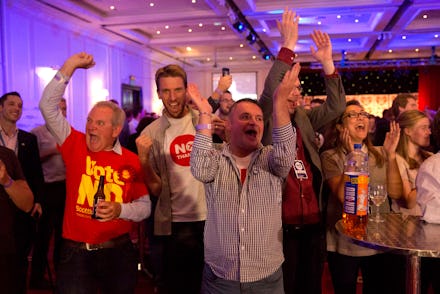The Union Was Saved, But Scotland's Saga Is Far From Over

In London: relief. Scotland will stay. The union is saved.
On Thursday, Scots took to the polls to answer a straightforward yes-or-no question: "Should Scotland be an independent country?" In the wee hours of Friday morning, it was declared that 55% of voters chose No.
But things are tense at Westminster. Months before the vote, Britain's three main political parties came together in a last-ditch effort to appease Scottish nationalists by promising Edinburgh more power vis-à-vis London. But thus far, there is little agreement on exactly what this new, rejigged U.K. would look like.
Many in England are not pleased with their Scottish neighbors. Critics of the independence movement point out that Scots enjoy more public spending per capita than the rest of the kingdom, and have threatened to slash Scottish budgets. (University tuition and prescription medications are free in Scotland, but not in England.) Others are protesting a troublesome quirk in Britain's constitutional arrangement, which allows Scottish MPs to vote on English affairs, but prevents English MPs from voting on Scottish affairs. Now the pressure is on the prime minister to fix long-standing legislative ills.
English-Scottish relations remain tense: In the days leading up to the vote, an overwhelmingly pleasant campaign turned rather sour. There were reports of anti-English attacks in Scotland, plus a fair amount of aggressive heckling. According to one poll, one-quarter of Scots believe that MI5, Britain's counter-intelligence service, was stealthily aiding the No side.
However, there's good news: Turnout was enormous, which represents a victory in itself. A record 86% of eligible voters voted. According to the referendum's chief counting officer, the pro-independence campaign earned 1,617,989 votes, while unionists secured 2,001,926. It was not, in the end, the too-close-to-call race that many pollsters and bookies predicted.
And British Prime Minister David Cameron is pleased. At 7 a.m. on Friday morning, he addressed reporters in London, declaring himself "delighted" with the results. The markets were delighted too. By mid-morning, the British pound was trading at its strongest level against the euro in two years.
Queen Elizabeth II, as of yet, has remained silent. She has reportedly kept abreast of developments at Balmoral, her sprawling castle estate in Aberdeenshire, Scotland, and is expected to release a written statement Friday afternoon. According to the Telegraph, palace staff spent the night drafting an address, which will focus on the need for unity.
The usually reserved monarch surprised many last week, when she cautiously urged Scottish voters to "think very carefully about the future." Palace officials later insisted that the queen's comments did not violate her constitutional impartiality.
On Friday, it was business as usual in London. British broadsheets could talk of little else, but there were no mass celebration rallies in the capital. Last Monday, some 5,000 Union flag-waving Brits attended a gathering in Trafalgar Square organized by TV historian Dan Snow, who aimed to show Scots "that England cares."
But at least the dust has settled, right? No. On Friday, Cameron declared that there would be "no disputes, no reruns" of the vote. But keen-eyed observers note that Scottish First Minister Alex Salmond was somewhat more equivocal.
At a rally in Edinburgh, Salmond acknowledged that Scotland had not chosen the path of independence — "at this stage."